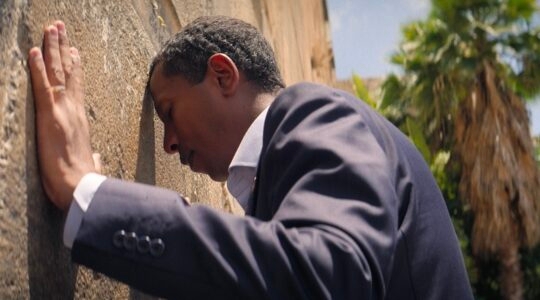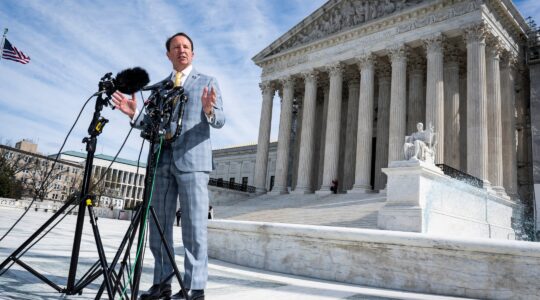(JTA) — The image started circulating almost as soon as the Israeli government finished voting to approve a divisive piece of legislation this week. “Shisha B’Av,” it said in white Hebrew letters against a black background – Hebrew for the Sixth of Av.
That was the Hebrew date on Monday, when right-wing lawmakers signed off on a law limiting the judiciary’s ability to review government decisions.
But the image, which spread widely within the sweeping movement protesting the legislation, wasn’t just marking the calendar. It was also invoking the fast day of Tisha B’Av, the Ninth of Av, just days away, which mourns the destruction of the ancient Holy Temples in Jerusalem. Rabbinic tradition says that collapse of Jewish sovereignty resulted as much from infighting as from external attacks — if not more so.
“No one is missing the symbolism on the left,” said David Selis, a graduate student at Yeshiva University who is researching the use of Jewish text and images in Israeli protests over time.
Selis had participated in multiple protests against the legislation in Jerusalem but was in New York City when it passed. In the hours after the Knesset vote, he tweeted a suggestion to read the Book of Lamentations, Tisha B’Av’s central scripture, outside the Israeli consulate when the holiday began on Wednesday night.
Others also suggested turning Tisha B’Av into a focal point for Jews mourning what they see as a catastrophic development in Israeli politics. Jewish leaders in Israel and the United States are invoking the fast day in their statements, rabbis are planning to speak about Israel at their congregations’ services and special events are being held to observe the day of mourning in public ways. The groundswell of attention, some say, could make Tisha B’Av newly relevant to non-Orthodox American Jews and secular Israelis, who have historically been less likely to observe its rituals.
“We are now a little over 24 hours away from Tisha B’Av, the day when we mark the loss of our sovereignty 2,000 years ago, due to internal fighting,” Julie Platt, chair of the Jewish Federations of North America, said during an online briefing about the legislation on Tuesday. “The parallels to today are frightening.”
Yedidia Stern, president of the Jewish People Policy Institute, added on the call, “I see radicalization right now on the street. And I really hope we’ll be able to contain it…. Let’s hope Tisha B’Av will be only a memory, not a reality for us.”
According to Jewish tradition, a string of calamities have befallen the Jews on the Ninth of Av. The destruction of the First Temple in 586 BCE and the destruction of the Second Temple in 70 CE — both known as “hurban habayit” in Hebrew — are the most prominent in a list of events cited by Talmudic rabbis in prescribing a day of fasting, prayer and mourning rituals. A series of more recent Jewish tragedies also took place on or near Tisha B’Av, including the expulsion of the Jews from England in 1290, France in 1306 and Spain in 1492; the beginning of the liquidation of the Warsaw Ghetto during the Holocaust, and the deadly 1994 bombing at the Jewish community center in Buenos Aires.
No one has died in Israel because of the right-wing government’s judicial reforms. But those who oppose the government say its aggressive bid to sap Israel’s judiciary of its independence does threaten the country’s security and stability in the future, and will put vulnerable Israelis at risk absent the court’s protection. Reportedly beginning with former Defense Minister Moshe Dayan 50 years ago, Israelis have often referred to the modern state of Israel as a “Third Temple,” or third Jewish commonwealth, following those that existed millennia ago.
“In Israel, even in the most secular spaces, people are referring to what the government is doing as ‘hurban habayit,’” said Rabbi Jill Jacobs, executive director of T’ruah, the liberal rabbinic human rights group. “It’s really clear that this is just a major incident that is going to have really lasting negative repercussions for Jews and also for Palestinians.”
The First Temple was destroyed by the Babylonians and the second by the Romans. But the ancient rabbis offered a slew of additional explanations that were enshrined in classic Jewish texts, including the Talmud. Chief among them, regarding the Second Temple, is the idea that “sinat chinam,” or wanton hatred, among Jews weakened the city, and there are others.
“One of the reasons that the Talmud mentions for the destruction of Jerusalem is the way that the judges were judging,” Jacobs said. The explanation is complex, she said, but boils down to the idea that the judges were applying the law very narrowly and not bringing in their own wisdom.
“The reason the Rabbis taught us all these reasons that the Temple was destroyed was not so they could say, ‘This is what people were doing back then. Weren’t they terrible?’” Jacobs said. “It’s about teaching us a lesson for today.”
Jacobs’ group has signed onto the public reading of the Book of Lamentations, known in Hebrew as Eicha, outside the Israeli consulate in New York City on Thursday afternoon, along with a growing number of local synagogues. The event marks the first time that UnXeptable, the protest movement of Israelis abroad that has organized solidarity rallies in New York City and elsewhere over the last six months, has partnered on a live citywide event with local synagogues and Jewish organizations beyond those in a progressive coalition.
“They actually reached out to us because they feel so worried and stressed and they feel the pain for what’s going on in Israel,” said Shany Granot-Lubaton, an Israeli protest leader in New York.
Rabbi Rachel Timoner, who leads Congregation Beth Elohim in Brooklyn, a Reform congregation that is participating in the rally, said her conversations with Israeli congregants and friends underscored the resonance of the holiday in this moment.
“Someone said they are experiencing an overwhelming ache in their body, just like when someone they loved died,” she said. “This is the exact feeling that Tisha B’Av is designed to evoke in us, to get us in touch with the collective grief of our people through time, and equally now.”
Timoner said she planned to speak “very very briefly” about “the pain and grief that Israelis and all who love them are feeling right now” during services on Wednesday night, even as many Israelis in her community will be joining a special Hebrew-language service targeted toward them elsewhere in Brooklyn.
Not everyone believes it’s appropriate to draw such a stark connection between Tisha B’Av and the contemporary political crisis, or to sermonize about politics at the dim, quiet services that will be held on Wednesday night.
“The talk of the lessons of Tisha B’Av are not as apropos as most of [Israeli Prime Minister Benjamin] Netanyahu’s opponents would like us to believe,” Jonathan Tobin, editor in chief of the right-leaning Jewish News Syndicate, wrote in a column on Tuesday.
“While neither side in this dispute should behave as if it has a monopoly on truth or righteousness,” he added, “it ill behooves Jews and friends of Israel looking on from abroad to be lecturing the prime minister and his supporters about sinat chinam, especially when the mindless hatred against fellow Jews seems to be mainly flowing against those who support judicial reform.”
But even for some on the right, the Tisha B’Av timing has been a cause for concern. David Friedman, former President Donald Trump’s ambassador to Israel, called the confluence of the vote and the fast day “very bad timing.”
“Given the striking parallels between Israel’s current internal rift and the infighting that caused the destruction of the Second Temple 2000 years ago, why would the Israeli Government proceed with its Judicial Reform bill on the eve of Tisha B’Av?” Friedman, who has long backed Netanyahu but has criticized the judicial reforms, wrote on Twitter.
The judicial legislation is not the first time that the Israeli political calendar has delivered a major crisis on Tisha B’Av. In 2005, the government proceeded with its withdrawal from the Gaza Strip on the eve of the holiday, against the fierce protests of many right-wing and religious Israelis who believed that ceding land represented a catastrophe for the Jewish people.
“I always found it chilling that the disengagement, that for many Israelis was physical destruction, was conducted on the eve of 9 of Av,” said Masua Sagiv, an Israeli professor at the University of California, Berkeley, and scholar at the Shalom Hartman Institute who studies contemporary Judaism in Israel. “And now, again, with legislation that promises to be the opening of a constitutional structural change threatening Israeli democracy and the basic fabric of the society in Israel, [the] Israeli government chooses this date.”
Sagiv published an essay in April, as Israel marked its 75th birthday, noting that the Jewish people’s attempts at sovereignty have tended to fall apart after 75 years. So the fact that the current conflict reached a turning point so close to Tisha B’Av felt especially poignant to her.
“Symbols receive their power from the interpretation we give them,” Sagiv said. “But here these interpretations seem inescapable, and still an opportunity to remind us what is at stake, and how grave the danger is, and how much work is ahead of us.”
Some in Israel will be connecting Tisha B’Av to the protest movement not by observing the holiday but by breaching it. Contrary to local ordinances, a number of restaurants in Tel Aviv plan to open their doors on Wednesday night. Some say they’re doing so in protest of the government or as a gesture of principle to their secular Israeli patrons.
Selis said he thought it was more likely that anti-overhaul Israelis would channel their political alienation through the traditions of the day. More modern practices include discussions of current events, which some communities use as a way to recognize the dissonance of lamenting Jerusalem’s destruction in a country that has a rebuilt Jerusalem as its capital.
“I think Tisha B’av is now going to be back on the secular Israeli consciousness,” Selis said. He added, “Secular or traditional sorts of Israeli society might be realizing that giving up control of so much of religious functioning of the state was a bad idea and… that they do, in fact, want there to be some religious identity for the state.”
Jacobs offered a similar prediction. “Many people in Israel feel like Judaism is something that’s coercive, something that’s only practiced by certain segments of the population, something that is used and misused for state power,” she said. “So it’s amazing that Israelis and others are saying, ‘No, actually, we’re going to claim Judaism and we’re going to find meaning in it.’”
For Granot-Lubaton, this Tisha B’Av will be her first observing in any way. “I thought about maybe fasting because I feel that I am in grief and in horrible pain for what’s going on in my country,” she said. “But I never mentioned Tisha B’Av [before]. I’m a secular Jew and this was never part of my day-to-day life.”
JTA has documented Jewish history in real-time for over a century. Keep our journalism strong by joining us in supporting independent, award-winning reporting.






